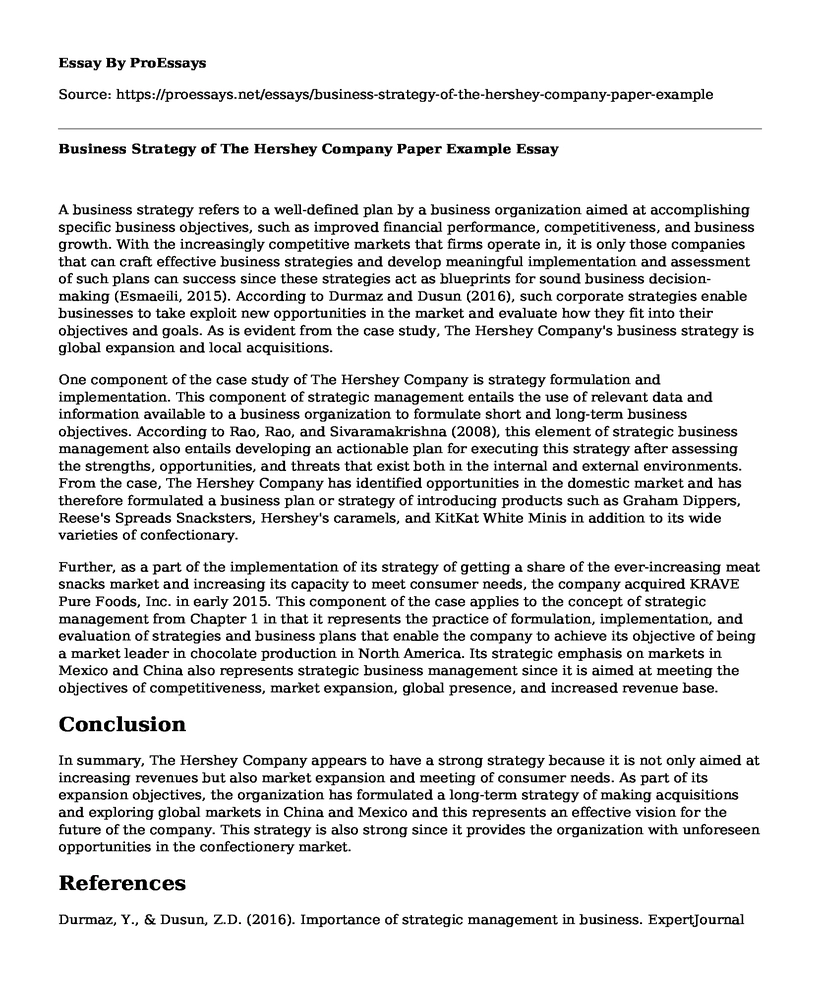A business strategy refers to a well-defined plan by a business organization aimed at accomplishing specific business objectives, such as improved financial performance, competitiveness, and business growth. With the increasingly competitive markets that firms operate in, it is only those companies that can craft effective business strategies and develop meaningful implementation and assessment of such plans can success since these strategies act as blueprints for sound business decision-making (Esmaeili, 2015). According to Durmaz and Dusun (2016), such corporate strategies enable businesses to take exploit new opportunities in the market and evaluate how they fit into their objectives and goals. As is evident from the case study, The Hershey Company's business strategy is global expansion and local acquisitions.
One component of the case study of The Hershey Company is strategy formulation and implementation. This component of strategic management entails the use of relevant data and information available to a business organization to formulate short and long-term business objectives. According to Rao, Rao, and Sivaramakrishna (2008), this element of strategic business management also entails developing an actionable plan for executing this strategy after assessing the strengths, opportunities, and threats that exist both in the internal and external environments. From the case, The Hershey Company has identified opportunities in the domestic market and has therefore formulated a business plan or strategy of introducing products such as Graham Dippers, Reese's Spreads Snacksters, Hershey's caramels, and KitKat White Minis in addition to its wide varieties of confectionary.
Further, as a part of the implementation of its strategy of getting a share of the ever-increasing meat snacks market and increasing its capacity to meet consumer needs, the company acquired KRAVE Pure Foods, Inc. in early 2015. This component of the case applies to the concept of strategic management from Chapter 1 in that it represents the practice of formulation, implementation, and evaluation of strategies and business plans that enable the company to achieve its objective of being a market leader in chocolate production in North America. Its strategic emphasis on markets in Mexico and China also represents strategic business management since it is aimed at meeting the objectives of competitiveness, market expansion, global presence, and increased revenue base.
Conclusion
In summary, The Hershey Company appears to have a strong strategy because it is not only aimed at increasing revenues but also market expansion and meeting of consumer needs. As part of its expansion objectives, the organization has formulated a long-term strategy of making acquisitions and exploring global markets in China and Mexico and this represents an effective vision for the future of the company. This strategy is also strong since it provides the organization with unforeseen opportunities in the confectionery market.
References
Durmaz, Y., & Dusun, Z.D. (2016). Importance of strategic management in business. ExpertJournal of Business and Management, 4(1), 38-45
Esmaeili, N. (2015). Strategic management and its application in modern organizations. International Journal of Organizational Leadership, 4, 118-126
Rao, C.A., Rao, B.P., & Sivaramakrishna, K. (2008). Strategic management and business policy: Text and cases. New Delhi: Excel Books
Cite this page
Business Strategy of The Hershey Company Paper Example. (2022, Nov 07). Retrieved from https://proessays.net/essays/business-strategy-of-the-hershey-company-paper-example
If you are the original author of this essay and no longer wish to have it published on the ProEssays website, please click below to request its removal:
- ERP and SCM Software Essay
- Product and Task Analysis: Coffee Brewing
- Why I Like the Apple Stock - Essay Sample
- CSR and Sustainability of the Oman Oil Company
- An In-Depth Comparison of Tylenol's 1982 Response to the Deaths in Chicago Versus 2009-10 Recall
- Essay on Theory-Based Risk Management: Conflict, Organizational Behavior & Vulnerability
- Reed Hastings: Risk-Taking Entrepreneur & Netflix Co-Founder - Essay Sample







